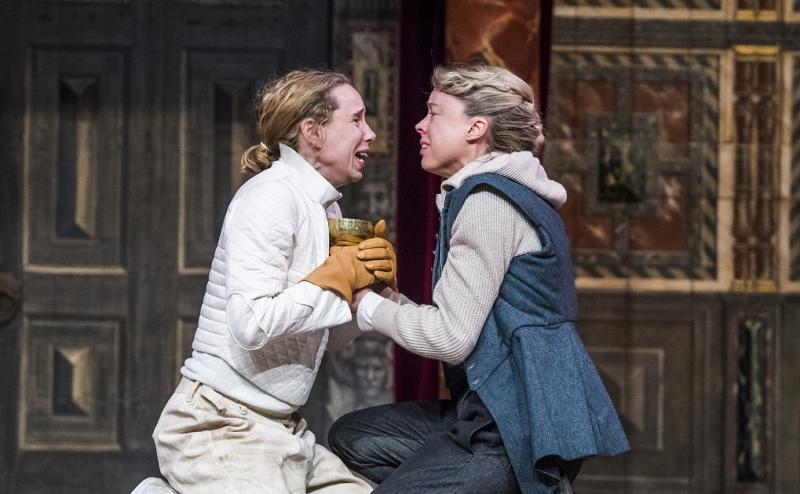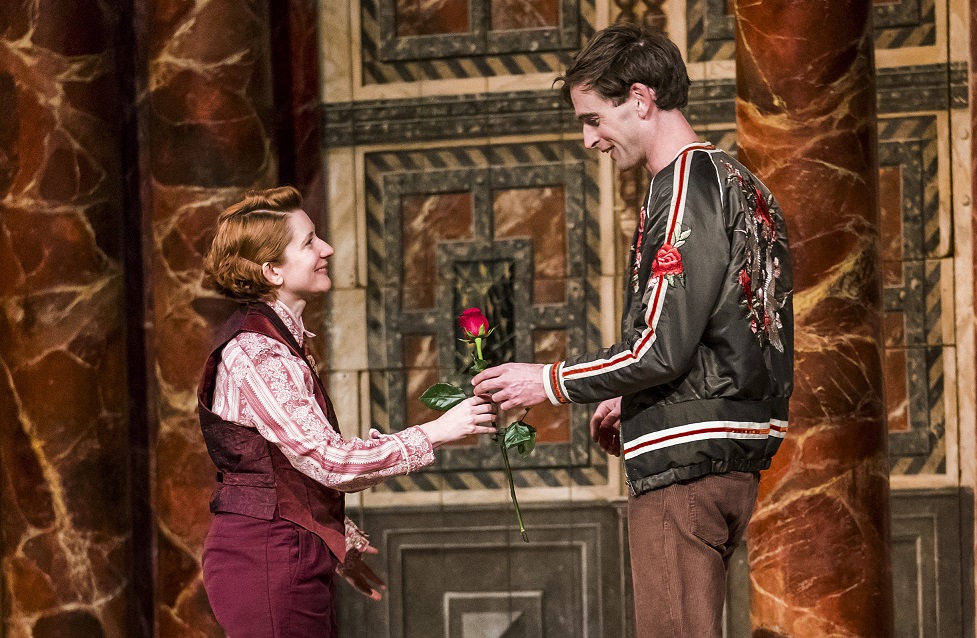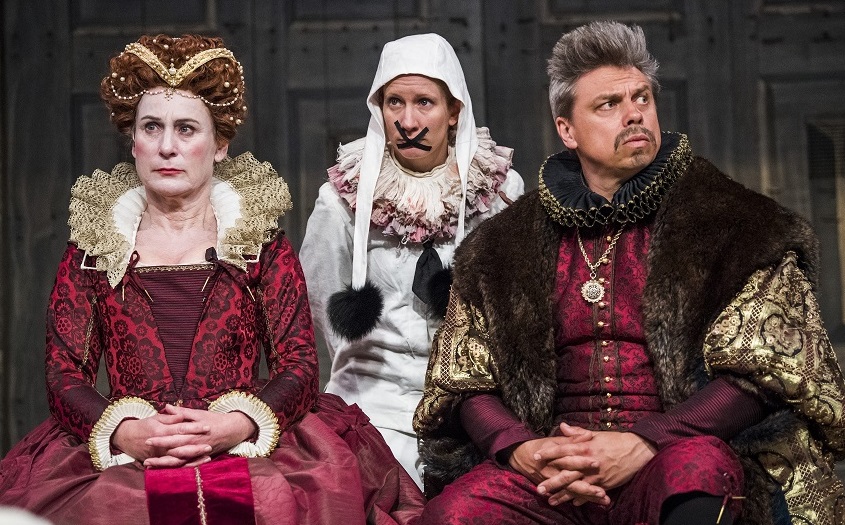As You Like It / Hamlet, Shakespeare’s Globe review - ensemble emphasis sets a leaner style | reviews, news & interviews
As You Like It / Hamlet, Shakespeare’s Globe review - ensemble emphasis sets a leaner style
As You Like It / Hamlet, Shakespeare’s Globe review - ensemble emphasis sets a leaner style
Michelle Terry's new company ups gender fluidity, charts new directions

There’s a distinct feeling of back to basics to this opening double bill at the Globe under the theatre’s new Artistic Director Michelle Terry. The elaborations (some would say gimmickry) of Emma Rice’s short tenure have been reined back, and a new concentration prevails.
That involved a gender-neutral approach (with a 50:50 gender ratio), and has made for a round-dozen company of versatile actors. They apparently rehearsed together – attending all rehearsals, regardless of appearance in any particular scene – over three months (considerably longer than usual). Federay Holmes and Elle While are jointly credited as directors for both shows, while Terry has spoken of “ownership” shared across the company.
Stature is as much of an issue in this 'As You Like It' as gender
The big issue is, of course, how such an approach has come to fruit in the productions. Another question entirely, whether these are “sibling” pieces which gain something by playing alongside one another on the same day? Not significantly so on the latter, I think, though there’s certainly real interest in seeing how the pairings work across the two plays.
On the former, Terry’s taking on the title role in Hamlet hardly qualifies as a surprise at all. It’s in the already role-overlapping world of As You Like It (★★★) that readjustments of expectation come into the equation. There’s certainly a new dimension to Jack Laskey (channelling David Tennant) as he moves from Rosalind’s stiff Spanish court skirts to a new naturalness of gait as the youth Ganymede; it certainly makes the “counterfeit to be a man” injunction freshly piquant. Casting Bettrys Jones as Orlando rather fudges the gender question, however, since the role here has a tomboy element of compromise; he/she's an aspiring boy-hero throughout, whose slight stature emphasises an immaturity that barely develops.
Indeed, stature is as much of an issue here as gender, with Laskey’s Rosalind/Ganymede – “more than common tall” has never rung truer – towering over Jones’s diminutive Orlando, an unlikely pairing that adds considerable humour (pictured below: Bettrys Jones, Jack Laskey). But is the extra confusion engendered by adding another layer to the role disguise a step too far: it's now that of a man playing a woman pretending to be a man, who is wooing a man, who's all the time, of course, really a woman? Possibly, but there’s insight, too. Much simpler is Helen Schlesinger’s doubling of the two dukes, as able as the swiftness with which, on a stage virtually free of props (which minimises our sense of contrast), the action transfers from court to forest. Laskey looms tall over Rosalind’s bosom companion Celia, too. Casting D/deaf performer Nadia Nadarajah (also playing Guildenstern in Hamlet) in that role challenges expectations in a different way. There’s definite expressiveness, and initial comedy to Celia communicating with Rosalind and others in sign language, while some of the sense lost is offered by those with whom she is conversing (it also reveals how the Duke her father doesn’t communicate with her at all). But there's no getting away from an accruing loss of story context and development, not to mention Celia's rapier textual wit.
Laskey looms tall over Rosalind’s bosom companion Celia, too. Casting D/deaf performer Nadia Nadarajah (also playing Guildenstern in Hamlet) in that role challenges expectations in a different way. There’s definite expressiveness, and initial comedy to Celia communicating with Rosalind and others in sign language, while some of the sense lost is offered by those with whom she is conversing (it also reveals how the Duke her father doesn’t communicate with her at all). But there's no getting away from an accruing loss of story context and development, not to mention Celia's rapier textual wit.
Designer Ellan Parry’s costumes have an ensemble quality too, spanning period to present day, and brought together from a range of sources (the Globe’s wardrobe reserves as well as items contributed, as in the theatre’s original day, by the players themselves). That gives the emotional conflicts and couplings of the down-to-earth forest natives a nicely contemporary context – almost, with the Welsh accents on display, a sense that we have dropped into Gavin and Stacey territory – into which Colin Hurley’s Touchstone fits fluently. He finds easy comradeship there with Pearce Quigley’s Jaques, lugubrious in black and complete with Russian philosopher beard, who gives his speeches an emphasised slow casualness (“Seven Ages of Man” begins mid-mouthful of banana).
Production-wise there could have been more comic touches like the flock of (human) sheep which accompanied the action’s move to Arden. The musically reinforced stag interlude starts up a growing ensemble haste, which concludes with Tanika Yearwood as Hymen in a scene that brings the spectacle to an ebullient conclusion, as well as offering the most elaborate stagecraft of the whole day.
The evening’s Hamlet (★★★★) felt considerably starker by comparison, as well as generally more conventional; this court is presided over by an all-too-solid regal pairing (pictured above: Helen Schlesinger as Gertrude, James Garnon as Claudius, with Bettrys Jones as a player), alongside Richard Katz who is winning, though hardly over-complicated, as Polonius. Michelle Terry's gender transposition proves more memorable than that of Bettrys Jones as Orlando, Hamlet’s slightness of youth accompanied here by a sense of flighty poetry that is brought home by a mid-play white-suited Pierrot costume: it might have seemed simply affected, but felt instead an effective interlude.
For this was a prince with as much a sense of “ecstasy” as of madness, whose soliloquies came over with an equal sense of real sincerity and colloquial, improvisatory freedom. Terry excelled in them, Hamlet’s agility emphasised too by an initial stiffness in Ophelia (Shubham Saraf), the result partly of costume. She began in another constricted court dress (if not as elaborate as the Velazquez riffs of As You Like It), which gave an attendant rigour of poise that lasted even into the simple black garb of madness.
The company of actors arrived straight from the present day, and the play-within-the-play, led by a jeans-clad Laskey (also a brisk Fortinbras) was a stand-out. Composer James Maloney was having fun with mysterious rumblings of the grave (moments relating to the Ghost), while jazz elements counterpointed the recurrent stern brass fanfares.
Both productions had moments which must have seemed better in concept than they did in execution: Hamlet seemed the more fully realised of the two, As You Like It perhaps yet to settle. For all the ensemble background to their creation, the central roles here (Terry as Hamlet, Laskey as Rosalind) rather defined both – and clarity of text, it's good to say, is back at the Globe. Co-directors Federay Holmes and Elle While prove that less is more (especially when you remember how inappropriate that “more” has occasionally been at the venue recently), though we can only guess quite what (and how) they contributed as directors in the standard sense when responsibilities were so shared. Under Terry’s inclusive helm, the Globe has already changed: there's more exploring to come before any new "face" reveals itself, but this bodes well.
- As You Like It and Hamlet at Shakespeare’s Globe to August 26
- Read more theatre reviews on theartsdesk
Explore topics
Share this article
Add comment
The future of Arts Journalism
You can stop theartsdesk.com closing!
We urgently need financing to survive. Our fundraising drive has thus far raised £49,000 but we need to reach £100,000 or we will be forced to close. Please contribute here: https://gofund.me/c3f6033d
And if you can forward this information to anyone who might assist, we’d be grateful.

Subscribe to theartsdesk.com
Thank you for continuing to read our work on theartsdesk.com. For unlimited access to every article in its entirety, including our archive of more than 15,000 pieces, we're asking for £5 per month or £40 per year. We feel it's a very good deal, and hope you do too.
To take a subscription now simply click here.
And if you're looking for that extra gift for a friend or family member, why not treat them to a theartsdesk.com gift subscription?
more Theatre
 Faustus in Africa!, Edinburgh International Festival 2025 review - deeply flawed
Bringing the Faust legend to comment on colonialism produces bewildering results
Faustus in Africa!, Edinburgh International Festival 2025 review - deeply flawed
Bringing the Faust legend to comment on colonialism produces bewildering results
 Edinburgh Fringe 2025 reviews: Imprints / Courier
A slippery show about memory and a rug-pulling Deliveroo comedy in the latest from the Edinburgh Fringe
Edinburgh Fringe 2025 reviews: Imprints / Courier
A slippery show about memory and a rug-pulling Deliveroo comedy in the latest from the Edinburgh Fringe
 Edinburgh Fringe 2025 reviews: The Ode Islands / Delusions and Grandeur / Shame Show
Experimental digital performance art, classical insights and gay shame in three strong Fringe shows
Edinburgh Fringe 2025 reviews: The Ode Islands / Delusions and Grandeur / Shame Show
Experimental digital performance art, classical insights and gay shame in three strong Fringe shows
 Edinburgh Fringe 2025 reviews: Ordinary Decent Criminal / Insiders
Two dramas on prison life offer contrasting perspectives but a similar sense of compassion
Edinburgh Fringe 2025 reviews: Ordinary Decent Criminal / Insiders
Two dramas on prison life offer contrasting perspectives but a similar sense of compassion
 Edinburgh Fringe 2025 reviews: Kinder / Shunga Alert / Clean Your Plate!
From drag to Japanese erotica via a French cookery show, three of the Fringe's more unusual offerings
Edinburgh Fringe 2025 reviews: Kinder / Shunga Alert / Clean Your Plate!
From drag to Japanese erotica via a French cookery show, three of the Fringe's more unusual offerings
 The Two Gentlemen of Verona, RSC, Stratford review - not quite the intended gateway drug to Shakespeare
Shakespeare trying out lots of ideas that were to bear fruit in the future
The Two Gentlemen of Verona, RSC, Stratford review - not quite the intended gateway drug to Shakespeare
Shakespeare trying out lots of ideas that were to bear fruit in the future
 Edinburgh Fringe 2025 reviews: The Horse of Jenin / Nowhere
Two powerful shows consider the Israeli-Palestinian conflict, with mixed results
Edinburgh Fringe 2025 reviews: The Horse of Jenin / Nowhere
Two powerful shows consider the Israeli-Palestinian conflict, with mixed results
 Edinburgh Fringe 2025 reviews: The Fit Prince / Undersigned
A joyful gay romance and an intimate one-to-one encounter in two strong Fringe shows
Edinburgh Fringe 2025 reviews: The Fit Prince / Undersigned
A joyful gay romance and an intimate one-to-one encounter in two strong Fringe shows
 Tom at the Farm, Edinburgh Fringe 2025 review - desire and disgust
A visually stunning stage re-adaptation of a recent gay classic plunges the audience into blood and earth
Tom at the Farm, Edinburgh Fringe 2025 review - desire and disgust
A visually stunning stage re-adaptation of a recent gay classic plunges the audience into blood and earth
 Works and Days, Edinburgh International Festival 2025 review - jaw-dropping theatrical ambition
Nothing less than the history of human civilisation is the theme of FC Bergman's visually stunning show
Works and Days, Edinburgh International Festival 2025 review - jaw-dropping theatrical ambition
Nothing less than the history of human civilisation is the theme of FC Bergman's visually stunning show
 Every Brilliant Thing, @sohoplace review - return of the comedy about suicide that lifts the spirits
Lenny Henry is the ideal ringmaster for this exercise in audience participation
Every Brilliant Thing, @sohoplace review - return of the comedy about suicide that lifts the spirits
Lenny Henry is the ideal ringmaster for this exercise in audience participation
 Edinburgh Fringe 2025 reviews: The Beautiful Future is Coming / She's Behind You
A deft, epoch-straddling climate six-hander and a celebration (and take-down) of the pantomime dame at the Traverse Theatre
Edinburgh Fringe 2025 reviews: The Beautiful Future is Coming / She's Behind You
A deft, epoch-straddling climate six-hander and a celebration (and take-down) of the pantomime dame at the Traverse Theatre

Comments
Oh, Lord. I didn't know the